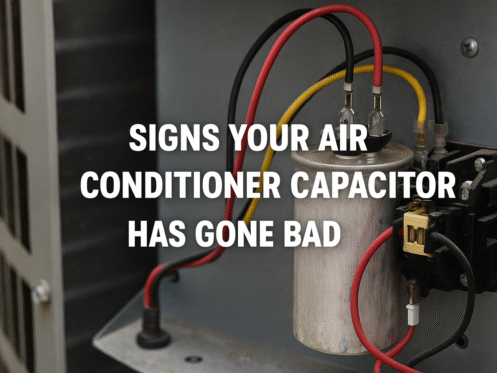Knowing the signs of a bad AC capacitor could be the difference between a needlessly expensive HVAC replacement and a simple repair task that will restore your system to its normal functions in minutes. In this guide, we’ll explain the top signs that an AC capacitor is faulty, why this component is so important to the functioning of your system, how to test and replace capacitors, and how the High 5 HVAC team can help homeowners in Denver with this vital job.
What Is an Air Conditioner Capacitor?
An AC capacitor is an electronic component that’s essential for the operation of your air conditioner. A capacitor stores just enough energy to allow your air conditioner’s compressor and fan motor to begin running. Once they can run on their own, the capacitor ensures a steady supply of energy to help keep these components running smoothly and efficiently.
Why Do Capacitors Fail?
Though most capacitors will last for about 10 to 20 years, they’ll inevitably start to deteriorate after this point, eventually leading to them failing completely. Other causes of a bad capacitor include overheating, sudden power surges, and extreme fluctuations in voltage to the AC unit.
Signs Your Air Conditioner Capacitor Has Gone Bad
Now that we understand what a capacitor is and why they might fail, how do you know when they’re the cause of your HVAC issues? Here are the top bad AC capacitor symptoms to be aware of.
AC won’t turn on
If your AC won’t turn on, there are multiple things that could be the cause. But one of the most common is a failed capacitor. If the capacitor is to blame, the compressor and blower motor won’t be able to start, meaning the system can’t run at all.
AC turns on but won’t stay running
If your AC does switch on, but shuts off again before long, it could indicate that the capacitor is starting to fail, but hasn’t completely died yet.
Weak or inadequate cooling
A failing capacitor won’t be able to run the AC’s compressor properly, causing your air conditioner to put out weak air (or sometimes warm air).
Clicking or humming noise
If your AC is making lots of strange clicking and humming noises, it usually means the motor is struggling to start and run, indicating a failing capacitor.
High energy bills
Rising energy bills with no change in usage are a common sign of problems with your AC. A failing capacitor forces your compressor to work harder, consuming more energy and increasing monthly utility bills.
Physical signs on the capacitor
If you can see bulging, a dome shape, leaking electrolyte fluids, or burn or scorch marks on the capacitor itself, it’s an obvious sign of the problem. A capacitor in this condition is extremely dangerous to use or even touch without the right knowledge. Shut off the power to your AC and contact a local HVAC pro right away.
Consequences of Ignoring a Bad Capacitor
If you don’t address a failing capacitor, you run the risk of serious damage to your home, HVAC system, or even yourself. So, will an AC run with a bad capacitor? Is it safe? Here’s what you need to know.
Poor cooling performance
Though not necessarily dangerous, an air conditioner that can’t cool your home is a real frustration. Continuing to run an AC with a bad capacitor will, at best, limit the cooling power of the unit, resulting in high energy bills with very little home comfort.
Damage to HVAC system
Running an AC with a bad capacitor puts strain on many other components in the system, such as the compressor and fan motor. This can dramatically shorten the lifespan of your unit, forcing you to pay for a replacement prematurely.
Home power issues
Running an AC with a bad capacitor might cause your electrical circuits to trip repeatedly, causing sections of your house to constantly lose power.
Fire
In extreme cases, a bad capacitor can overheat and cause a fire in your home. This is a serious hazard that comes with neglecting to change your AC capacitor.
Electric shock
Rarely, a failing capacitor can shock you when you touch it or the surrounding components. Though this usually isn’t enough to be dangerous, these shocks can still be painful.
How to Test for a Faulty Capacitor
Testing a capacitor isn’t too difficult with the right tools and a little knowledge. Here’s how to do it:
- Step one: Turn off the power to your AC at your circuit box.
- Step two: Find the cylindrical capacitor near the compressor or motor.
- Step three: Visually inspect it for damage.
- Step four: Discharge the capacitor using a screwdriver with an insulated handle, releasing stored energy and making it safe to touch.
- Step five: Measure capacitance using a multimeter.
- Step six: Compare the readings with the numbers printed on the capacitor label, and replace if necessary.
Preventing Capacitor Failure
To prevent capacitors from failing prematurely, make sure your HVAC system is stored in a well-ventilated area with good airflow. This prevents overheating, which can cause capacitors to fail sooner. It’s also wise to install a surge protector to ensure the capacitor doesn’t get overloaded and damaged. We also suggest regularly cleaning your HVAC system and investing in routine HVAC maintenance to help extend the lifespan of your capacitor and other components.
Want an Estimate to Replace Your AC Capacitor? Contact the HVAC Professionals at High 5
For something so small, a reliable capacitor makes all the difference when it comes to relying on your air conditioner. If you’re looking for professional help with this important task, look no further than the pros at High 5. We have the tools and knowledge to quickly diagnose, replace, and test your capacitor, ensuring your AC is ready to run reliably throughout the warmer months. To get your AC capacitor replacement estimate, don’t hesitate to reach out to us today!

